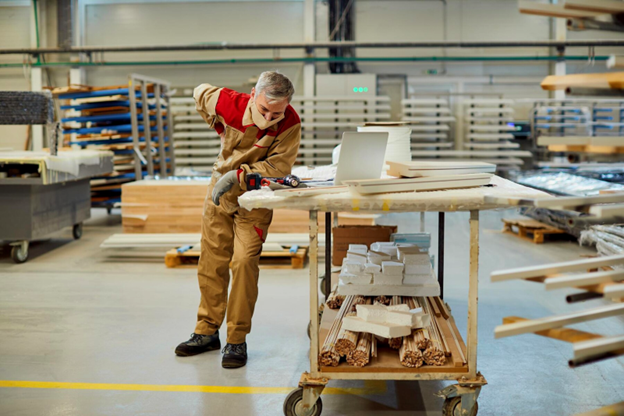
Maximizing Productivity with Ergonomic Design Principles for Work Environments

Ergonomic design plays a big role in productivity and well-being at work. From office spaces to manufacturing floors, implementing ergonomic principles not only enhances comfort and safety but also boosts productivity and employee satisfaction.
In this article, we explore the essential ergonomic design principles that can transform work environments into incredibly efficient and productive centers.
What is Ergonomics?
“Ergonomics is the science of designing environments and products to fit the people who use them, optimizing human performance and well-being.”
It encompasses various factors, including physical comfort, safety, and cognitive ergonomics, which focuses on mental processes like perception and decision-making.
By incorporating ergonomic design principles, workplaces can minimize discomfort, reduce the risk of injury, and enhance overall efficiency.
5 Ergonomic Design Principles
Prioritizing Proper Posture and Support
One of the fundamental principles of ergonomic design is proper posture and support. Chairs and workstations should be adjustable to accommodate different body types and promote neutral postures.
Supportive chairs with lumbar support and adjustable armrests help maintain proper alignment, reducing strain on the back and neck. Ergonomic accessories like footrests and wrist supports further contribute to comfort and well-being.
Optimizing Workspace Layout and Accessibility
Efficient workspace layout plays a crucial role in ergonomic design. Workstations should be organized to minimize unnecessary movements and promote accessibility to frequently used items. This reduces strain and fatigue, allowing employees to focus on tasks without unnecessary distractions.
Additionally, ensuring adequate space for movement and proper lighting contributes to a comfortable and productive work environment.
Embracing Sit-Stand Solutions for Dynamic Workspaces
The rise of sedentary lifestyles has prompted the adoption of sit-stand solutions in modern workplaces. Adjustable desks that allow employees to alternate between sitting and standing positions promote movement and reduce the negative health effects associated with prolonged sitting. This dynamic approach to workspace design not only improves physical well-being but also enhances cognitive function and productivity.
Integrating Ergonomic Tools and Equipment
In addition to furniture and workspace layout, ergonomic design extends to the selection of tools and equipment. Ergonomically designed tools reduce strain and fatigue, enhancing efficiency and safety.
For example, ergonomic keyboards and mice promote natural hand positioning, reducing the risk of repetitive strain injuries. Similarly, tools with padded handles and adjustable grips minimize discomfort during prolonged use.
Considering Human Factors in Design
Ergonomic design principles also take into account human factors such as anthropometry, which studies human body measurements, and biomechanics, which examines how the body interacts with its environment.
By considering these factors, designers can create products and environments that accommodate a diverse range of users, ensuring inclusivity and accessibility.
Conclusion
In conclusion, ergonomic design principles are indispensable for creating productive and supportive work environments. Investing in ergonomic design not only benefits employees’ well-being but also contributes to overall productivity and success.
Transform your workplace with VMS Consultants – Best Architect Consultant in Ahmedabad.
Contact us today to integrate ergonomic design principles seamlessly into your workspace, increasing productivity and well-being for your team.





